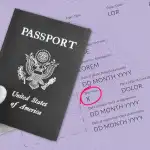Even before President Donald Trump took office for his second term, transgender Americans reported harassment and discrimination while traveling. But in January, the administration announced it would no longer issue “X” gender markers on passports or allow transgender Americans to update passports to accurately reflect who they are. The announcement coincided with a slew of executive orders targeting transgender people.
Since then, many trans people have started making preparations to travel abroad. But how safe is it to travel and what documents are needed? With reports of federal officials seizing documents circulating on social media and anxiety running high, The 19th asked the country’s best experts on trans documents some of the hardest questions on what trans travelers should expect. Here’s what we learned:
Is my passport that has an updated gender marker still valid?
Yes. In the first days of the Trump administration, confusion was rampant. The State Department has since clarified that all current valid passports, including those with “X” gender markers, will be honored.
Advocates caution that transgender travelers may still face harassment from state and federal officials who feel emboldened by the apparent hostility coming from the Trump administration.
Arli Christian, senior policy counsel at the American Civil Liberties Union (ACLU), advises transgender travelers to carry backup documents like a birth certificate and a copy of the federal policy to give them more leverage and confidence.
“Really make sure you’re armed with all the information you need to calmly inform an officer what your rights are,” Christian said.
-
Read Next:
Can I still update the gender marker on my passport to reflect who I am post transition?
Not now, but maybe soon. For now, the State Department is not accepting requests to update gender markers to correctly reflect transgender people’s genders. In fact, many transgender people have applied for passports since Trump took office and received documents back with an inaccurate gender marker.
But Carl Charles, a senior attorney in the southern regional office of Lambda Legal, the nation’s largest LGBTQ+ legal group, said in an informational session for the general public this month that those looking for updated passports still have reason for hope.
The ACLU is suing the Trump administration over the gender marker passport policy, and the organization is seeking a preliminary injunction, or an immediate halt to the policy, while the case plays out in court. A judge is expected to rule on the injunction within the next few weeks.
“If it is the case that the judge enters an injunction and stops this passport policy from being in effect, that may be the time when people with upcoming renewals or soon-to-expire passports want to submit a passport application, because there may be a chance there may be a window that they can get a document with a correct gender marker,” Charles said.
What if I want to revert my gender marker back to my sex assigned at birth for safety reasons?
The 19th has confirmed a handful of cases in which transgender people or the parents of transgender youth have successfully reverted documents back to a marker reflecting a person’s sex assigned at birth. For some, including those with “X” gender markers, this can feel like a safer option because they may face less scrutiny from officials.
Will my documents be seized if I reenter the country?
A number of transgender people have expressed reluctance to leave the United States for fear that their passports will be confiscated upon their return.
The 19th has not found confirmed cases of this happening, and Lambda Legal, which is tracking several transgender travelers, has not either.
-
Read Next:
Does Canada accept my “X” gender marker? Is Canada trans friendly?
Yes, and yes.
“The Government of Canada recognizes the ‘X’ gender identifier,” according to a government page designed specifically for LGBTQ+ travelers.
The 19th got the same response from multiple Canadian officials, who noted that transgender Americans would be welcome to come to Canada as tourists, temporary residents or even asylum seekers.
“In my personal opinion, Canadians would welcome Americans to Canada,” said Kate Rogers, a spokesperson from Canada’s tourism agency, in an email. “And, as part of the LGBTQ2+ community, the Government of Canada supports this community as does the Canadian Border Services Agency.”
I have to get a passport for my children. Will using my passport as a trans person applying for my kids put me at risk of document seizure?
Christian advises that this is likely safe but that applicants should use caution, adding that the State Department does not have the right to update a person’s passport if they are not the applicant.
“I would certainly use the birth certificate as proof of citizenship rather than sending in your fully valid U.S. passport,” they said. “Because the concern I would have is that the State Department will see that passport, see that they may notice that the sex designation is not sex at birth, according to their new policy, and they may take it upon themselves to go ahead and update that.”
Is it still safe to fly with my driver’s license? What if my license has an “X” designation?
Every piece of guidance from advocates, both formal and anecdotal, suggests that state IDs and driver’s licenses are not impacted by the State Department policy.
Amy Paris, who formerly worked for the federal government and led the implementation of “X” gender markers on passports, told The 19th that as of now, Transportation Security Administration officials have not been advised to scrutinize gender markers in screenings.
“If they have a state-issued REAL ID in their proper gender, in the gender they identify with, they will probably be able to fly just fine,” Paris said.
But Paris also urged caution, especially for gender-nonconforming travelers. “I hate that we’re talking about passing privilege here, but it’s just a fact,” Paris said.
“If it is more likely that a transportation security officer is going to identify you as trans, then I would say, yeah, if it’s possible to take the bus or the train and you’re worried about getting unnecessarily patted down, or having your documentation questioned, the bus or the train is probably a better mode of travel,” she said.
Advocates are recommending that trans people don’t use passports domestically — why?
“I think a lot of what we’re trying to do is reduce the possibility of undue scrutiny, harassment, discrimination, as you’re moving through security and so again, every individual is really best suited to know what that looks like for them,” Christian said. “But if you’ve got a passport that has a sex designation that does not match who you are, and a state ID that does, my recommendation would be to use that state ID.”








